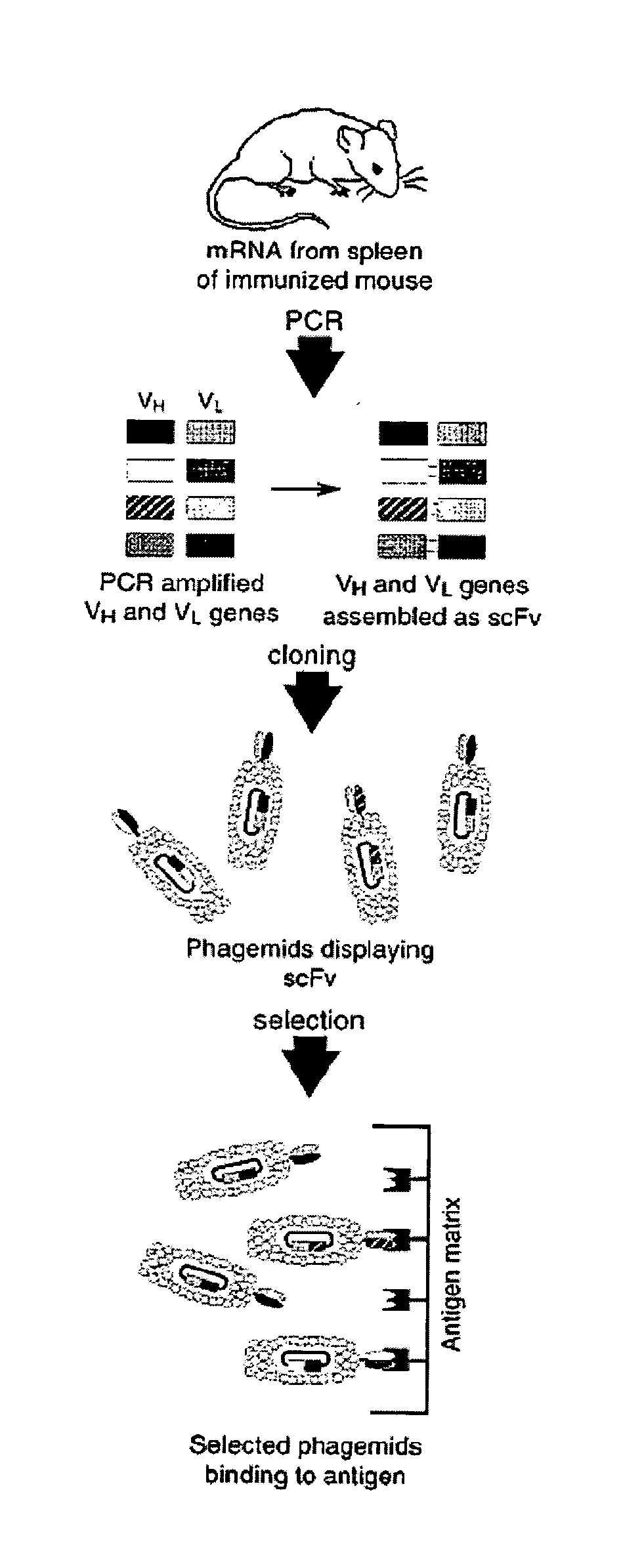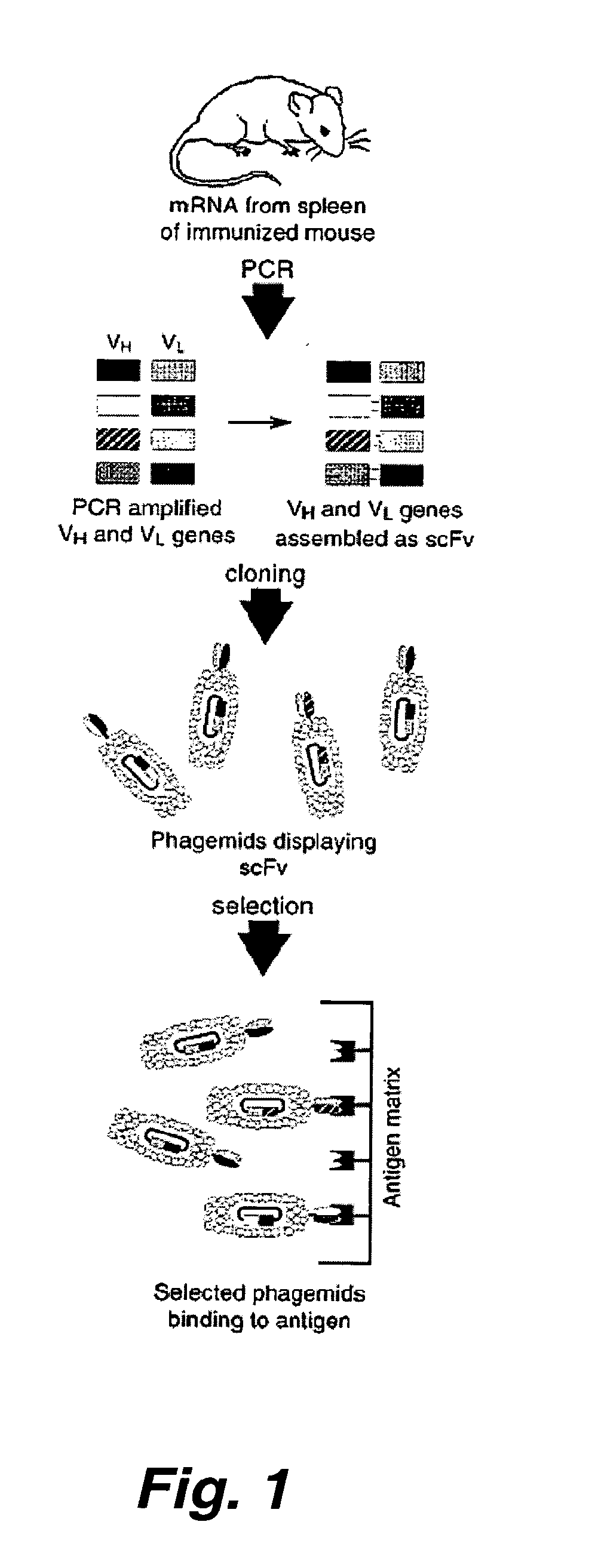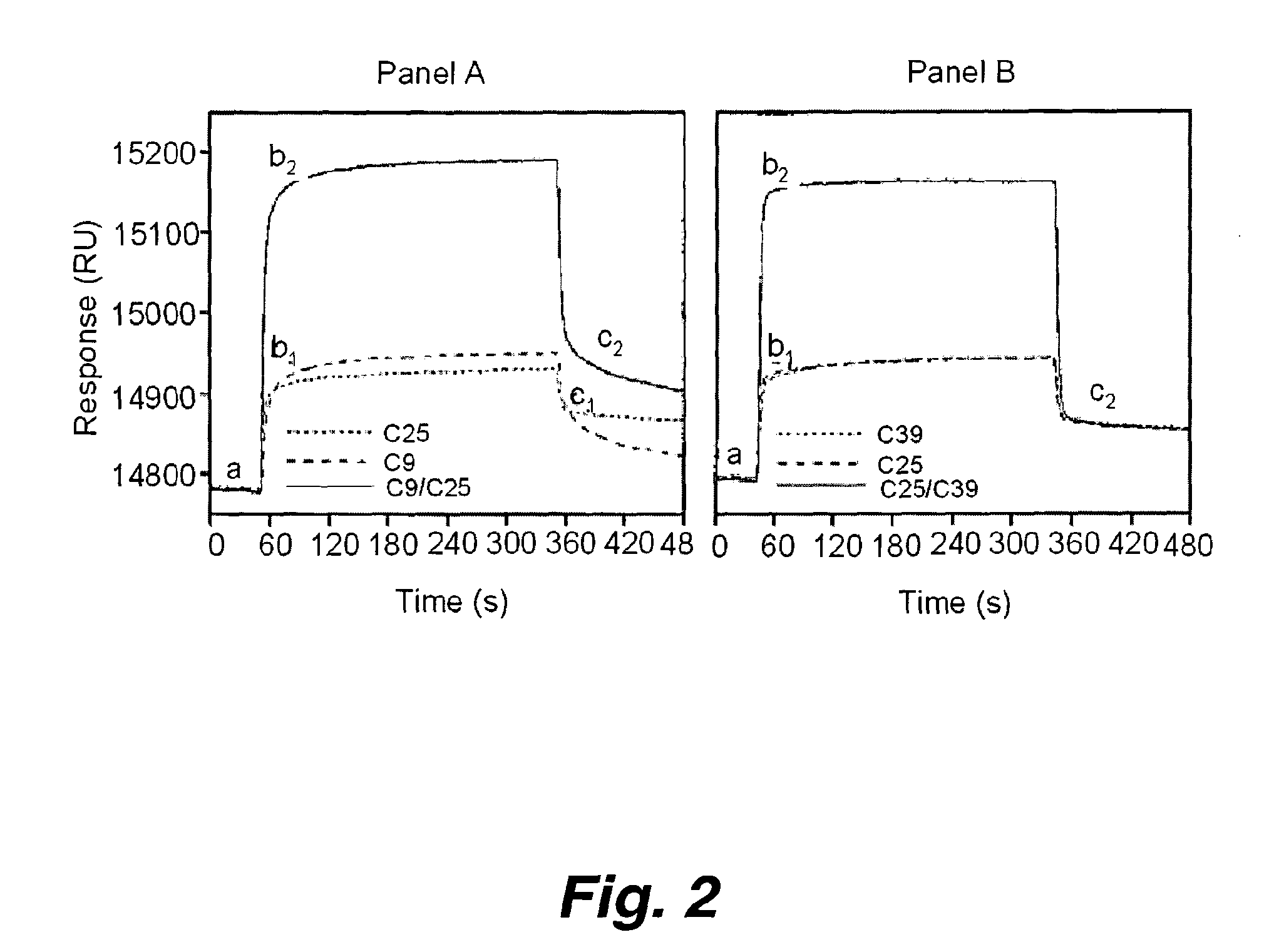Therapeutic monoclonal antibodies that neutralize botulinum neurotoxins
a technology of monoclonal antibodies and botulinum neurotoxins, applied in the field of therapeutic monoclonal antibodies that neutralize botulinum neurotoxins, can solve the problems of high incidence of side effects, serum sickness and anaphylaxis, and limitations of human body, and achieve the effect of reducing or eliminating the symptoms of botulism
- Summary
- Abstract
- Description
- Claims
- Application Information
AI Technical Summary
Benefits of technology
Problems solved by technology
Method used
Image
Examples
example 1
Preparation of Botulinum Neurotoxin Neutralizing Antibodies
Materials and Methods
[0181]A) Oligonucleotide Design.
[0182]Family-specific murine VH and VK primers were designed as previously described for human V-gene primers (Marks, et al. (1991) J. Mol. Biol. 222:581-597; Marks, et al., Eur. J. Immunol. 21:985-991) to amplify full-length rearranged V genes. Briefly, murine VH and VK DNA sequences were collected from the Kabat (Kabat, et al. (1991) Sequences of proteins of immunological interest, U.S. Department of Health and Human Services, U.S. Government Printing Office, Bethesda, Md.) and GenBank databases, aligned, and classified by family, and family-specific primers were designed to anneal to the first 23 nucleotides comprising framework 1. Similarly, JH and JK gene-segment specific primers were designed to anneal to the final 24 nucleotides comprising each of the 4 JH and 5 JK gene segments (Kabat, et al. supra.).
[0183]B) Vector Construction.
[0184]To construct the vector pSYN3,...
example 2
Potent Neutralization of Botulinum Neurotoxin by Recombinant Oligoclonal Antibody
[0229]The spore-forming bacteria Clostridium botulinum secrete botulinum neurotoxin (BoNT), the most poisonous substance known (Gill (1982) Microbiol. Rev. 46: 86-94). The protein toxin consists of a heavy and light chain that contain three functional domains (Simpson (1980) J. Pharmacol. Exp. Ther. 212: 16-21; Montecucco and Schiavo (1995) Q. Rev. Biophys. 28: 423-472; Lacy et al. (1998) Nat. Struct. Biol. 5: 898-902). The C terminal portion of the heavy chain (Hc) comprises the binding domain, which binds to a sialoganglioside receptor and a putative protein receptor on presynaptic neurons, resulting in toxin endocytosis (Dolly et al. (1984) Nature (London) 307: 457-460; Montecucco (1986) Trends Biochem. Sci. 11: 315-317). The N-terminal portion of the heavy chain (HN) comprises the translocation domain, which allows the toxin to escape the endosome. The light chain is a zinc endopeptidase that cleave...
example 3
Genetic and Immunological Comparison of Anti-Botulinum Type A Antibodies from Immune and Non-Immune Human Phage Libraries
[0252]Understanding the antibody response in botulinum intoxication is important for vaccine design and passive prophylaxis. To investigate this activity, we have studied the immune response to BoNT / A (botulinum neurotoxin serotype A) binding domain (HC) at the molecular level using phage display. The scFv antibodies were isolated from V-gene repertoires prepared from (a) human volunteer immunized with pentavalent botulinum toxoid and (b) non-immune human peripheral blood lymphocytes and splenocytes. A large panel of serotype specific phage expressing botulinum binding scFv could be selected from both libraries. Epitope mapping of immune scFv binders towards BoNT / A HC revealed surprisingly a limited number of scFv recognizing conformational epitopes that corresponded to two distinct groups, clusters I and II. Only scFv from cluster I exhibited neutralizing activit...
PUM
 Login to View More
Login to View More Abstract
Description
Claims
Application Information
 Login to View More
Login to View More - R&D
- Intellectual Property
- Life Sciences
- Materials
- Tech Scout
- Unparalleled Data Quality
- Higher Quality Content
- 60% Fewer Hallucinations
Browse by: Latest US Patents, China's latest patents, Technical Efficacy Thesaurus, Application Domain, Technology Topic, Popular Technical Reports.
© 2025 PatSnap. All rights reserved.Legal|Privacy policy|Modern Slavery Act Transparency Statement|Sitemap|About US| Contact US: help@patsnap.com



